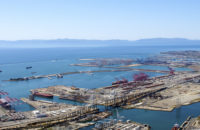In a move to give a lift to early-stage bridge infrastructure work, the U.S. Dept. of Transportation’s Federal Highway Administration has selected 23 projects to share a total of $18.4 million in Infrastructure Investment and Jobs Act-funded bridge planning grants.
The awards, announced on Oct. 12, are a subset of the IIJA’s new discretionary Bridge Investment Program, or BIP.
View one-page summaries of the winning projects here.
The Bridge Investment Program is funded at $12.5 billion over five years and is one of several IIJA and pre-IIJA programs at U.S. DOT in which states or localities compete for limited funding available.
The winners of the first BIP construction grants, which are expected to be larger than the planning grants, have not yet been announced.
The winning planning projects are located in 23 states. Thirteen of the winners are in urban areas and 10 in rural areas.
Each of the federal grants will be supplemented by nonfederal funds.
Creating a Project 'Pipeline'
Polly Trottenberg, U.S. DOT deputy secretary, said in a statement that the planning grants “will be used to create a pipeline of future bridge construction projects to improve safety, add or improve multi-modal access, support economic competitiveness and to provide resilient highway infrastructure that is better able to withstand the effects of climate change.”
Stephanie Pollack, FHWA acting administrator, said the grant amounts met the levels the applicants had sought.
FHWA said that projects receiving planning grants also could be candidates to receive construction grants in the future from the Bridge Investment Program and other FHWA programs.
Top Five Grants
The largest planning grant in the new round, $2.4 million, was awarded to the City of Seattle to plan a replacement for the 4th Street Bridge over the Argo Railyard. The total planning costs are estimated at $3 million.
A FHWA fact sheet says that the bridge has been partially closed since October 2017 and no traffic is allowed in the northbound curb lane.
The Seattle DOT said in a blog post, "Future bridge replacement would provide for reliable travel for people walking, biking, riding transit and driving in cars, as well as for freight trucks to access jobs and essential services."
The agency added that a replacement bridge also would protect efficient rail freight movement in the railyard under the present bridge.
The second-largest award, $1.98 million, went to the Cape May County Bridge Commission in New Jersey to determine preferred alternatives to replace four bridges, which FHWA said are “outdated and unsafe.” The total estimated planning cost is $2.58 million.
The agency also said two of the bridges would be bundled into one larger project; the other two would be done as individual projects.
The City of New York is receiving $1.6 million, to plan a 30-year capital construction program for four well-known East River bridges—the iconic Brooklyn Bridge as well as the Manhattan Bridge, Williamsburg Bridge and Ed Koch Queensboro Bridge.
The total estimated planning cost is $2 million.
FHWA says the eventual result will be a “suite” of proposed projects that would be carried out through 2050.
The City of Philadelphia is getting $1.56 million for a planning and feasibility study to rehabilitate 18 bridges over rail lines, most of which are operated by Amtrak and the Southeastern Pennsylvania Transit Authority (SEPTA). Total planning costs are estimated at $1.95 million.
FHWA says that “the study will allow the city to work with Amtrak and SEPTA to develop a comprehensive strategy for improving the condition of aging bridges and for prioritizing and bundling bridge projects for future contracts."
Also on the list is a $1.29-million grant to Alaska’s Kodiak Island Borough for a planning study to replacing the Kodiak Sargent Creek and Russian River bridges.






